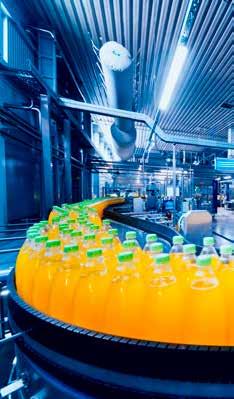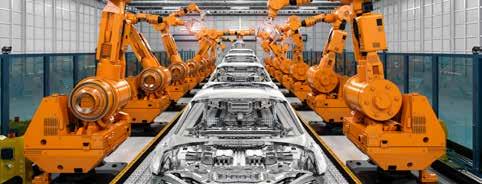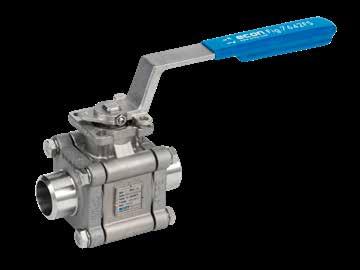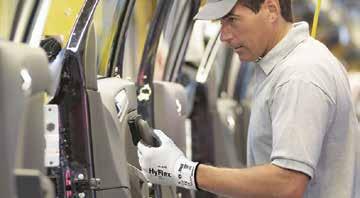
5 minute read
trade rules A reduction in water usage in manufacturing is needed
A manufacturing focus shift
According to a recent survey published by Make UK and PwC, the UK’s new trading relationship with the EU, coupled with attractive investment and talent recruitment opportunities are clouding many manufacturers’ judgement. Although more and more companies believe that the positives outweigh the risks in terms of boosting productivity and agility through investment.
Advertisement
Make UK chief executive, Stephen Phipson, said: “The transition to new trading arrangements with the EU was always going to be the biggest challenge facing manufacturers this year. However, just as the sector rose to the challenge of aiding the national effort at the start of the pandemic, it is clearly set to do so again as we re-build the economy and take advantage of the opportunities from digital technologies.” Controlling costs remains a priority, but an estimated 57% of manufacturers are looking to invest in new product developments, and positively, 25% of businesses are looking to re-shore their overseas activities back to the UK. Additionally, 30% are planning to enter new markets this year, diversifying their income streams in a conscious effort to combat any similar crisis’ in the future.


Nissan moves to take advantage of UK post-Brexit trade rules
New post-Brexit trade rules guaranteeing zero tariffs on EU exports has pushed Japanese auto manufacturer, Nissan, to reconsider its production of batteries used in their Leaf electric cars, moving production to the UK, a strategy which has been given the thumbs up by Prime Minister Boris Johnson.
COO, Ashwani Gupta, believes that this agreement will ‘redefine’ the UK’s automotive industry, whilst protecting thousands of jobs in the process. He said: “Sunderland is one of the top three plants in the world for competitiveness for Nissan. Brexit gives us a competitive advantage in the UK and outside.” Currently an estimated 30,000 Leaf electric cars are manufactured each year at the facility, most using a locally sourced 40kWh battery. This new move from Nissan will see more powerful 62kWh versions which are currently made in the company’s home country, move to their Sunderland facility.
Ian Hart, Business Development Director at adi Projects, has suggested that a reduction in water consumption in manufacturing is needed, and argues that only by making changes to our approach now, will this precious resource remain protected for the future.
According to the Environment Agency, demand for water could exceed supply within 25 years, siting that water usage has risen from 85L per day in the 1960s to 143L per day presently, partly due to an increase in population during that period. But only by doing our bit, can we avert this problem. So, why aren’t UK manufacturers taking steps towards conserving water? Such as do many manufacturers in Africa who use a process called ‘managed aquifer recharge’ that injects wastewater back into the ground for reuse. What Ian is suggesting, is that if manufacturers are committed to water conservation, we will all reap the benefits. Engaging with an expert partner to conduct a water audit will establish your usage, how effectively it’s being used, and identify opportunities to reduce consumption. This will then be followed by determining how new processes can be integrated to enable the recovery and reuse of water.
Ian argues that now is the time to change our mindset and understand that water is a scarce commodity and begin to treat it with more care and respect. Then we will all be winners.
ECON launches new series of ball valves

Ball valves take a leading role in the valve industry, catering for an enormous scope of applications across a wide variety of industries.
ERIKS own brand, ECON, who has been manufacturing proven-quality designs since 1892 focusing on technical superiority, has recently launched a new series of premium 3-piece ball valves. The quarter-turn construction makes these valves easy to operate and reduces maintenance costs. Moreover, the full bore versions are ideal for conditions which require maximum flow capacity with minimum pressure drop. These new valves are food safe to EC1935 when ordered in stainless steel trim, and are also available with Fire Safe or Lloyds certification and can be fitted with a variety of actuators. If you would like further information, please contact your local ERIKS Service Centre.


Combat high-traffic touch points with high-level protection
For over 100 years, Ansell has been delivering advanced protection solutions designed to keep people out of harms way, utilising decades of expertise, innovative technologies and cutting-edge design techniques.
Introducing the HyFlex® 11-100 – the only industrial glove available on the market designed with Ionic+™, an EPA-registered antimicrobial technology that lasts the lifecycle of the product, and self-sanitising 360° protection of both the liner and coating to protect from bacterial-related odour, stain and fabric degradation. Perfectly suited for industries including manufacturing, logistics, transportation, recycling, waste disposal and hospitality, HyFlex® 11-100 gloves are compliant with EU biocides Regulations 528/2012 and are touchscreen compliant for added convenience.
Actively remove stubborn rust with OKS 661
The appearance of stubborn rust is an issue presented to maintenance engineers and mechanics far and wide. But now, thanks to the newest addition to the ever-expanding OKS portfolio of speciality lubricants, the ingenious formula of OKS 661 is the answer to your rust problems.
A new, chemically active rust remover, OKS 661 has been specifically engineered to loosen problematic rusting connections, remove flash rust, and eradicate nuisance stains from difficult to access areas with speed, during repair and maintenance servicing tasks. Safe for use in both indoor and outdoor environments due to its zero petrol and mineral oil content, the slow evaporation rate of OKS 661 achieves an increased exposure time, meaning that even the most stubborn rust will reliably dissolve, restoring connection mobility to ensure maximum efficiency.










